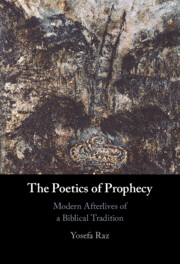Book contents
- The Poetics of Prophecy
- The Poetics of Prophecy
- Copyright page
- Dedication
- Contents
- Illustrations
- Acknowledgements
- Introduction
- Chapter 1 Seraphic Choirs and Stuttering Prophets: Symmetry, Disorder, and the Invention of the Literary Bible
- Chapter 2 Walking through William Blake’s Irregular Bible
- Chapter 3 The Myth of Primordial Orality and the Disfigured Face of Written Prophecy
- Chapter 4 Ahad Ha’am’s Mask of Moses and the Secularization of Prophetic Power
- Chapter 5 Haim Nahman Bialik: The National Poet’s Cup of Sorrows
- Afterword
- Bibliography
- Index
- Index of Biblical Quotes
Chapter 3 - The Myth of Primordial Orality and the Disfigured Face of Written Prophecy
Published online by Cambridge University Press: 14 December 2023
- The Poetics of Prophecy
- The Poetics of Prophecy
- Copyright page
- Dedication
- Contents
- Illustrations
- Acknowledgements
- Introduction
- Chapter 1 Seraphic Choirs and Stuttering Prophets: Symmetry, Disorder, and the Invention of the Literary Bible
- Chapter 2 Walking through William Blake’s Irregular Bible
- Chapter 3 The Myth of Primordial Orality and the Disfigured Face of Written Prophecy
- Chapter 4 Ahad Ha’am’s Mask of Moses and the Secularization of Prophetic Power
- Chapter 5 Haim Nahman Bialik: The National Poet’s Cup of Sorrows
- Afterword
- Bibliography
- Index
- Index of Biblical Quotes
Summary
For Julius Wellhausen, the German biblical scholar best known for formulating “the documentary hypothesis,” prophecy served as a marker of religious authenticity. He portrays Ezekiel as denigrated, deceitful, and weak – the linchpin in the story of the transformation of ancient Israel from tribal vitality to priestly fossilization. Yet the carefully constructed scholarly story Wellhausen tells about ancient Israel is structured through fanciful Romantic dichotomies; he maligns scribal culture while evoking a nostalgia for an imaginary oral culture. Wellhausen was deeply influenced by the orientalist fantasies of writers like Goethe and Herder; furthermore, their melancholia about European writing culture continues to influence biblical scholarship’s (mis)understanding of prophecy. Moving away from Wellhausen, I ask how we could read Ezekiel’s weakness, specifically through his face-turning prophecies – not as “diminished” gestures of once-powerful mantic acts, but as creative, rhizomatic acts which expand the possibilities of the prophetic genre?
Keywords
- Type
- Chapter
- Information
- The Poetics of ProphecyModern Afterlives of a Biblical Tradition, pp. 89 - 120Publisher: Cambridge University PressPrint publication year: 2023

